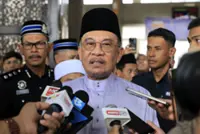TOKYO: Economic policymaking in the 2020s and beyond needs to take into account the circumstances surrounding three global megatrends: geopolitics, digitalisation and climate change, said Prime Minister Datuk Seri Anwar Ibrahim.
While countries may not have control over external factors wreaking havoc elsewhere globally and leaving a trail of economic challenges in our backyard, straightforward preemptive measures have boosted confidence that Malaysia's economic footing will not be shaky.
In response, Malaysia has recently unveiled three key policy frameworks to provide greater certainty, clarity, and transparency regarding the future of the economy, Anwar told the 29th International Conference on The Future of Asia, also known as the Nikkei Conference, on Thursday (May 23).
"These strategic blueprints are indicative of Malaysia’s role in building Asian leadership in the economic, digital and sustainability domains. Indeed, uncertainty abroad has only solidified our resolve to be forward-looking and proactive for the sake of domestic policy certainty and creating a prosperous future for all,” said Anwar.
The first framework, the Madani Economy, delineates strategies for sustainable and inclusive development.
"At the core is the importance of not just raising the ceiling for real GDP growth in the range of 5.5 to 6.0 per cent per annum, but also raising the floor to ensure the fruits of prosperity are shared equitably among all Malaysians.
"The Madani Economy framework aligns closely with Prime Minister Kishida-san’s New Form of Capitalism policy, underscoring the deep connection and shared aspirations between our countries,’ he added.
Anwar also highlighted the New Industrial Master Plan 2030 (NIMP 2030) as Malaysia's second major policy, representing a comprehensive governmental approach to industrial policy.
"We have hit the ground running by convening stakeholders from the public and private sectors to chart the way forward for specific strategic sectors, such as semiconductors and steel.
"The successful implementation of this Plan will allow us to stand on the shoulders of giants in this region and bring us closer to achieving high-income status by the end of this decade,” said Anwar.
Finally, he touched on the National Energy Transition Roadmap, which outlines Malaysia’s strategy to achieve net-zero emissions by 2050.
This involves implementing initiatives in energy efficiency, renewable energy, hydrogen, green infrastructure, carbon capture, utilisation, and storage to enhance Malaysia’s climate resilience. - Bernama
Anwar's speech in its entirety can be read here.









































